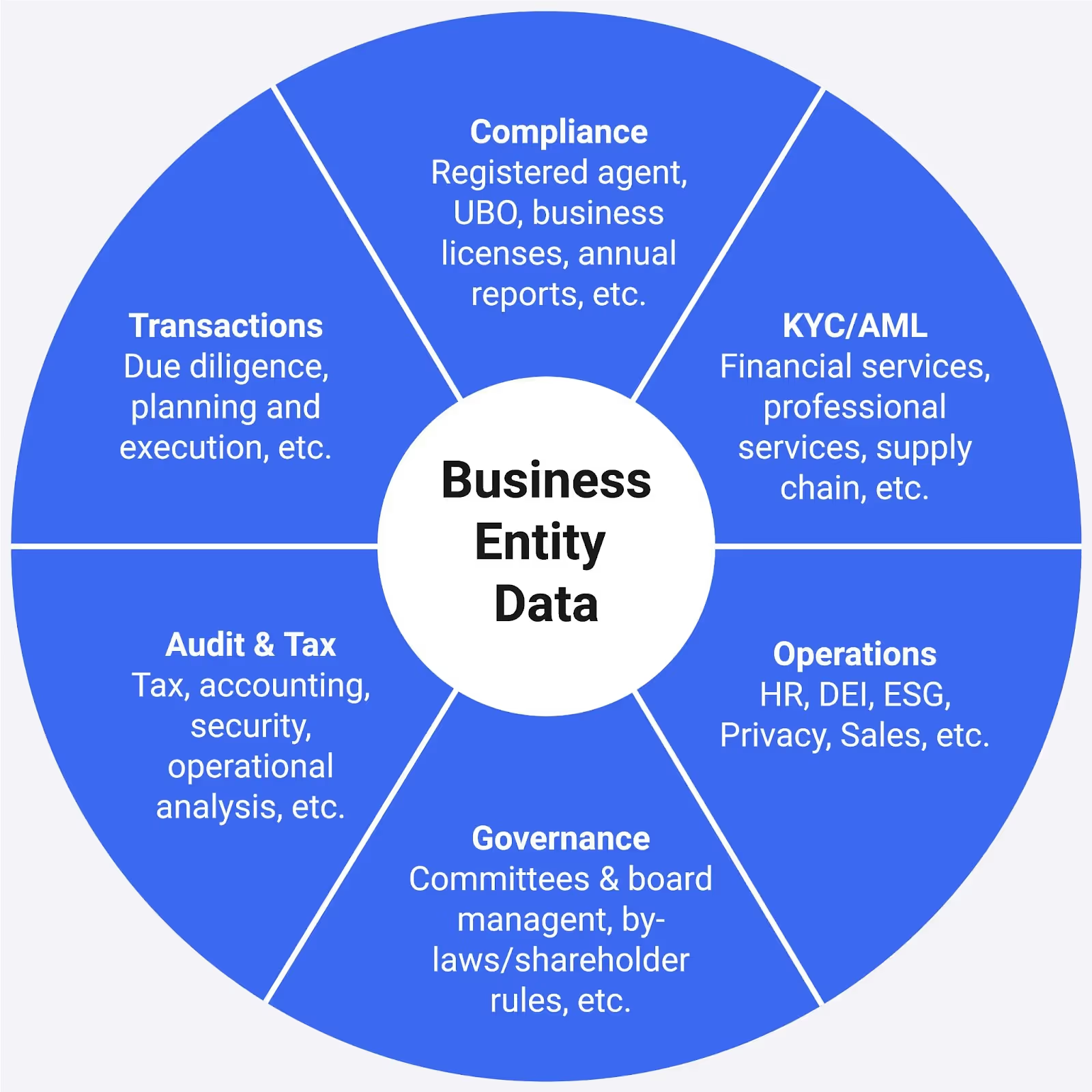Corporate subsidiary data is business-critical data that finds a purpose in almost every business process. Audit & tax professionals rely on it for security and operational analysis; it’s required for legal compliance, governance, and more. However, many organizations struggle to operationalize it company-wide despite its crucial nature.

The Problem
These operational challenges typically occur because of:
- Entity management is a shared responsibility.
Cross-departmental collaboration is usually a substantial challenge for most large organizations that leads to friction around ownership and responsibility. 76% of legal departments report having five or fewer employees focused on entity management. However, 73% reported leveraging finance departments, and 53% reported utilizing the tax departments in the entity management process. - Outdated legacy software.
Most technology solutions on the market today were created before the turn of the century. Legal teams worldwide rely on antiquated software that doesn’t suit today’s modern needs. 96% of legal departments report issues with their legal entity management software. 72% find it difficult to keep systems updated, and 62% find it challenging to track governance activity statuses.
- No centralized management of service providers.
As companies grow, they naturally leverage a decentralized mesh of law firms by managing entities for basic statutory compliance. This model can create coordination and cost management challenges. Currently, 47% of legal departments currently operate in this decentralized model.
The Consequences
Without proper implementation, organizations might face a series of consequences ranging from inconvenient to severe.
Low-Level Consequences:
- Administrative and regulatory friction from having to retroactively fix problems that occurred from poor management
Mid-Level Consequences:
- Delayed strategic transactions such as IPOs, financings, or M&A
- Dissolved entities that leave assets stranded with no direct ownership link to the parent
- Directors appointed to subsidiary boards that are no longer employed with the company, so board resolutions cannot be effectively signed
Severe Consequences:
- Piercing the corporate veil
- Transfer pricing non-compliance & other task risks
Companies like Coca-Cola saw firsthand the risks associated with non-compliant entities when they faced $12 Billion in tax penalties.
Are Your Corporate Entities Mismanaged?
A system in disrepair might suffer from the following business ailments:
- Missed compliance deadlines & corresponding fines
- Inability to foresee and plan for upcoming costs
- No visibility at the international local level
- Often needing to rectify out-of-date information
Combatting these Challenges with Technology
When looking to improve your corporate subsidiary management, it’s important to rely on solutions that:
- Reduce Financial Risk
- Provide Visibility Across Departments
- Reduce Outside Counsel Spend
- Meet Regulatory & Privacy Requirements
- Facilitate Timely High-Level Decisions
Reduce Financial Risk
Entity management systems with compliance calendars give businesses a safeguard. This feature ensures that your team stays up-to-date on filings and registrations and meets other business-critical deadlines and expirations. It also creates a steadfastness for documents or intercompany agreements if you face litigation or audits.
Provide Visibility Across Departments
When entity data relates to all aspects of your business, it’s important to have a system that allows for visibility cross-departmentally. With programs like Athennian, there are different sharing capabilities, including admin access, read-only access, and more. This ensures that the right people have at-your-fingertips access to the right information.
Reduce Outside Counsel Spend
As businesses scale, bringing down overhead spend is always a priority. With a single source of truth, companies can easily keep track of all their corporate data when outsourcing. Still, using this system allows for data clearly tracked and in one place when and if they move processes in-house. Features like document automation also aid in saving money on lawyer fees.
Meet Regulatory and Privacy Requirements
Features like custom reports and custom tracking allow for enhanced visibility. With programs like Athennian, users can ensure that their data is formatted correctly, report on entities as needed, filter out entities based on regulatory requirements, report on beneficial ownership, and more.
Facilitate Timely High-Level Decisions
With a digital single source of truth, information lives at your fingertips and can be trusted. And because project management plays a huge role in the day-to-day operations of in-house legal teams, this data can be visible to finance professionals, tax professionals, and other stakeholders, allowing for business decisions to be made quickly.
Want to Learn More?
Access our on-demand webinar, “Leveraging Technology to Avoid Mismanagement of Corporate Subsidiaries,” for best practices, use cases, and more.





.svg)



.avif)




-p-500.webp)
-p-500.webp)
-p-500.webp)
.webp)
